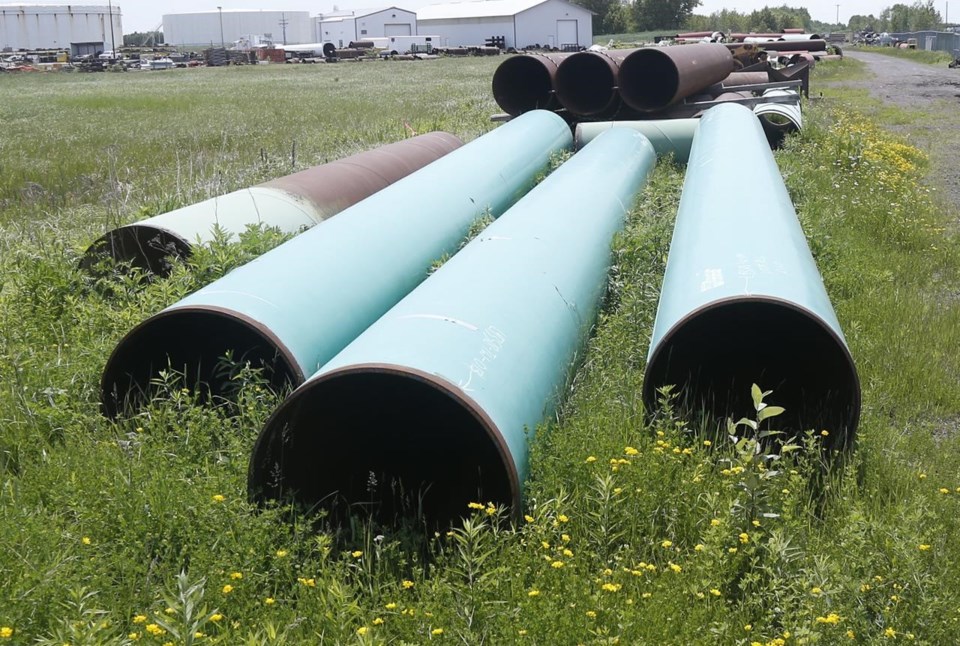MADISON, Wis. (AP) ŌĆö An attorney for the energy company Enbridge tried to persuade a federal appellate court Thursday to vacate an order that would shut down part of a pipeline running through a Wisconsin tribal reservation.
The company contends that U.S. District Judge William Conley improperly ordered Enbridge to shut down a 12 mile (19 km) portion of Line 5 within three years. The section runs across the Bad River Band of Lake Superior Chippewa's reservation. Conley also ordered the company to pay the tribe millions of dollars in trespassing fees, Enbridge attorney Alice Loughran told a three-judge panel at the 7th U.S. Circuit Court of Appeals in Chicago.
She said Conley's order violates a 1977 treaty between the United States and sa╣·╝╩┤½├Į that states no authority in either country shall impede the flow of oil and natural gas through pipelines between the two nations. Enbridge wants to reroute the pipeline around the reservation, but needs more time to secure permits from multiple government agencies, Loughran said.
ŌĆ£The court's shut-down order is prohibited,ŌĆØ she said.
The Bad River tribe's attorney, Paul Clement, implored the judges to go beyond Conley's order. He urged them to shut down the pipeline immediately to protect the environment from a potential spill and increase the financial penalties Conley imposed on Enbridge for trespassing on the reservation.
ŌĆ£Enbridge wants to continue business as usual,ŌĆØ Clement said.
Line 5 transports up to 23 million gallons (about 87 million liters) of oil and liquid natural gas daily. The pipeline runs from the city of Superior, Wisconsin, through northern Wisconsin and Michigan to Sarnia, Ontario.
to force the company to remove the portion of Line 5 that crosses its reservation, saying the 71-year-old pipeline is dangerous and land easements allowing Enbridge to operate on the reservation expired in 2013. Enbridge has proposed removing the pipeline from the reservation and rerouting it, but the project depends largely on obtaining permits from multiple government agencies.
Bad River members asked Conley in May to force Enbridge to shut down parts of Line 5 across their reservation, arguing that erosion posed an immediate risk of rupture and contamination. The company says there haven't been any spills from Line 5 in Wisconsin since 2002, when a leak was contained at its Superior terminal.
Conley in June every part of the pipeline that operates on the reservation by June 2026. He also ordered the company to pay the tribe more than $5.2 million for trespassing and to keep paying as long as the pipeline keeps operating on tribal land.
The appellate judges questioned why government agencies haven't moved faster to grant Enbridge permits to reroute the pipeline. They also chastised the tribe for not taking preemptive steps to protect the area from a possible spill, such as placing sandbags around it.
Loughran said the tribe hasn't allowed Enbridge to take protective steps, while Clement countered that the tribe shouldn't have to do anything since Enbridge is trespassing.
The judges sounded frustrated with the two sides refusing to work together. ŌĆ£The parties have mutually declared war against each other,ŌĆØ Judge Michael Scudder said.
Judge Frank Easterbrook said the panel likely won't issue a ruling for at least several months.
Enbridge has been under scrutiny since 2010, when its Line 6B pipeline ruptured in southern Michigan, releasing 800,000 gallons of oil into the Kalamazoo River system.
MichiganŌĆÖs Democratic attorney general, Dana Nessel, filed a lawsuit in 2019 seeking to shut down twin portions of Line 5 that run beneath the Straits of Mackinac, the narrow waterways that connect Lake Michigan and Lake Huron. Nessel argued that anchor strikes could rupture the line, resulting in a devastating spill. That lawsuit is still pending in a federal appellate court.
Michigan regulators in December approved the company's $500 million plan to encase the portion of the pipeline beneath the straits in to mitigate risk. The plan is awaiting approval from the U.S. Army Corps of Engineers.
Todd Richmond, The Associated Press



